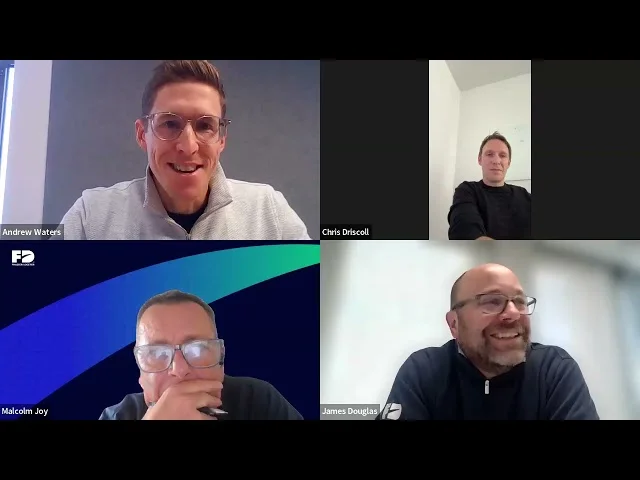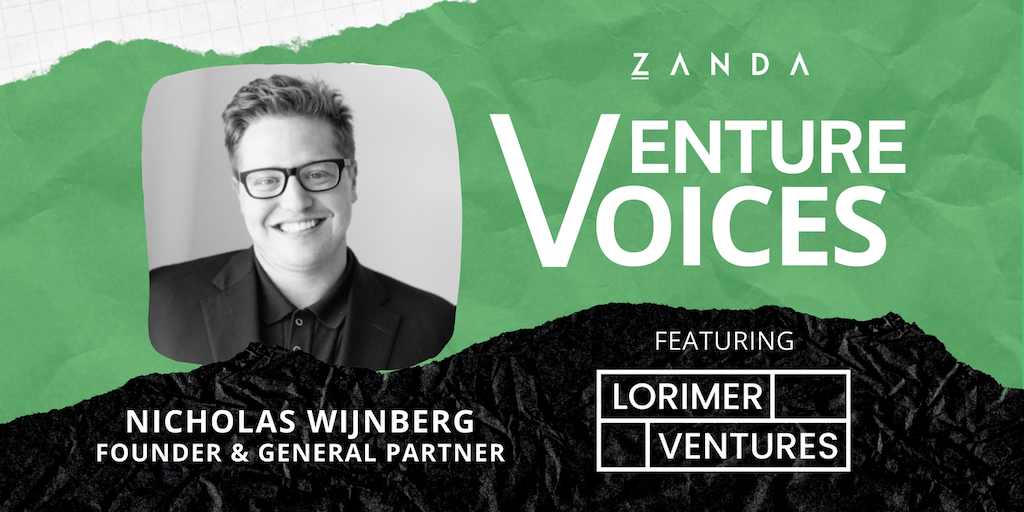
Venture Voices | Lorimer Ventures
09 Apr, 202510 minutes
This month Venture Voices was joined by Nick Wijnberg, the Founder and General Partner of Lorimer Ventures, an operator-led early-stage investment firm dedicated to supporting and empowering startup builders from inception through scale.
With a background in finance, venture investing, and strategic operations, Nick brings a wealth of experience to the startup ecosystem. In this discussion, Nick shares his insights on venture investing, the evolving role of CFOs in the AI era, and how startups can best position themselves for success in today’s competitive market.
Don’t have time to read the entire discussion, use our index to jump to the sections you want to read about on our website or watch the full discussion on our youtube channel.
Nick you have a diverse background, can you give us an insight into what else you’re working on alongside being COO at Lorimer Ventures.
In addition to serving as Chief Operating Officer of Lorimer Ventures, I am also CFO and Head of Finance at Ridepanda, a micro-mobility-as-a-benefit startup backed by General Catalyst, Blackhorn, Yamaha Ventures, Proeza, and others. I also sit on the boards of Upflow, an AR collection workflow and payments platform, and Oatfi, a company specializing in embedded working capital as a service - both portfolio companies of Lorimer Ventures and deeply aligned with our investment philosophy.
Beyond my core roles, I provide fractional CFO services and advisory support to startups navigating fundraising, financial modeling, and investment strategy. I’m also actively involved in mentoring the next generation of founders, working with AgLaunch, an ag-focused accelerator, and Nashville’s Entrepreneur Center through the Project Fintech accelerator.
Before transitioning into venture, I spent a decade as a commercial banker, specializing in large corporate credit syndications, digital transformation initiatives, and LP investments in rural business investment corporations. Prior to that, I worked at Citi as an equity derivatives trader and in structured credit sales.
My co-GP at Lorimer, Stephan Cizmar, and I first crossed paths during our undergraduate years at Colby College. Today, I split my time between New York and Nashville, where I live with my wife and our newborn son.

You have a uniquely diverse background with deep expertise across multiple areas. How has that shaped your approach at Lorimer Ventures? And what ultimately inspired you to co-found the firm?
It was truly serendipitous. If you had asked me 10 years ago, especially right out of college, whether I’d be in venture, let alone working with Stephan, I wouldn’t have believed it. Stephan and I were undergrads together at Colby College, but at the time, I envisioned a career on Wall Street while he was building his path in tech. Venture wasn’t something I had considered, nor did it feel particularly accessible to me.
As I worked with founders and entrepreneurs in my role as a lender, I began to realize I had more to offer beyond just being a source of capital. I didn’t want to be just another financial partner whose only value-add was the cost of capital, I wanted to be meaningfully involved. That led me to angel investing independently in 2017, initially without a defined thesis, but with the mindset of having skin in the game. I believed that by investing personally, my advice would carry more weight, and I could engage with founders in a more impactful way. Over time, I started to see that I needed to invest where I truly understood the customer journey and where I could make a real difference during those high-stakes, pivotal moments.
Ironically, Stephan and I reconnected through a cap table. My last name is a bit unique, and when he spotted it, he reached out and said, "Wait, you’re doing venture too?" He had also been writing angel checks, and we quickly realized we should join forces. That’s how Lorimer Ventures was born. Initially, it started informally outside of AngelList as a network of operators pooling small checks together, rolling up our sleeves, and actively helping founders.
We had both experienced the disconnect between traditional investors and the operators actually building companies. Too often, there was an ivory tower dynamic with investors advising from a distance rather than getting in the trenches. We built Lorimer Ventures to change that. It’s a firm created by operators, for operators, designed to be the first call for founders, not just when things are going well, but especially when they’re not. We saw an opportunity to be truly helpful at the earliest stages, and that’s the foundation of what Lorimer Ventures is all about.

That leads into my next question: how does Lorimer Ventures truly stand out in such a saturated market, both in the startup and VC space?
We put a significant amount of effort into building a network designed to truly support our founders and bring them into a larger ecosystem of experienced operators and investors. It all starts with our core team: Stephan, Pete, Zach, and myself, each of whom has hands-on experience scaling companies across different roles, from the earliest stages through late-stage growth.
Beyond that, our venture partner network adds another layer of expertise, offering deep product-market specialization, hiring networks, and access to top-tier talent that can be directly plugged into our portfolio companies. Many of our venture partners are potential buyers themselves or have strong relationships in the buyer seat, which helps our startups secure early design partners and land key enterprise customers.
Additionally, we leverage our network of investors, expanding the range of financing options available to our founders, not just dilutive capital but also non-dilutive capital where appropriate. While many funds aim to be value-add, we take inspiration from firms like Founder Collective and Homebrew, which have stayed small, highly intentional, and deeply engaged with their portfolio companies.
Ultimately, what sets us apart is how we activate our network across three core areas: hiring, go-to-market support and customer acquisition, and FP&A advisory. This hands-on, operator-driven approach is what makes Lorimer Ventures different.
Your expertise as a CFO is something we are particularly interested in. How do you see that skill set adding value to the founder community, and what unique insights do you bring to the table?
Everyone has their role, and for me, coming from both Wall Street and Main Street lending, my focus has always been on managing risk. Founders are incredible at taking risks, often placing bold bets to drive their companies forward. But translating those risks into measurable numbers and understanding which risks to take and the return they should expect is where I step in to help.
I work with founders to align their strategic goals with a solid financial plan, ensuring their vision is not only ambitious but also grounded in data. By being highly data-driven, I help make their vision digestible for key stakeholders, whether it's investors, lenders, or board members.
My experience in raising capital and structuring deals allows me to help founders build sustainable business models. A great product alone isn’t enough. If the business isn’t financially viable, growth will be a challenge. That’s where I add value.
Beyond just advising, I stay deeply engaged in the operational side of finance. At Ridepanda, I’m constantly testing new FP&A tools and financial strategies, which means I can offer founders real-world, first-hand insights rather than just theoretical advice.
Of course, finance is just one part of the equation. My partners bring expertise in go-to-market strategy, product development, and hiring, so together, we provide a well-rounded, hands-on support system for founders navigating the early stages of building their companies.

The biggest question that we get from founders is, when should they hire someone full-time and what level of finance leader should they look for. How do you advise your portfolio companies to approach this level of hiring?
It really depends on the business, particularly the asset needs of the company. For very soft asset businesses, like pure software companies where the founder is technical and can build most things early on, finance may not be as critical until the company is post-revenue. But for capital-intensive startups that require fixed assets and financing to scale, bringing in a finance leader earlier becomes much more important.
Understanding the specific needs of your business is key. The timing varies based on industry, but as a general rule, once a company is post-revenue or raising a significant financing round, it’s time to consider hiring a finance professional. I typically see anything over 500K as a medium-to-large round, at which point having someone who can translate strategic decisions into financial models and assess ROI becomes crucial.
Every decision should be viewed as an investment, whether it’s hiring, purchasing software, or launching a marketing campaign. Founders need to understand the expected return on those investments, and that requires financial expertise.
As soon as a company starts making larger investments in hiring or marketing, it should bring in finance expertise to assess unit economics and long-term sustainability. While the timing will vary, I generally recommend hiring earlier rather than later, ideally once a company is post-revenue, at the seed stage, or entering Series A.
What are the most important qualities a founder should look for in a finance leader to ensure they can help scale the company?
Finding the right finance leader is about complementing the founder’s vision. The ideal hire depends on the strengths and weaknesses of the founding team, so it’s important to bring in someone who fills the gaps and adds operational discipline.
A strong finance leader will establish the processes needed to reconcile financials each month, ensure accounts receivable are collected and monitored properly, align payables with cash flow, and verify that commission structures for sales teams match executed contracts. There are countless financial aspects that founders need to manage, and having the right finance professional in place makes a huge difference.
While there’s no one-size-fits-all approach, the key is finding someone who brings operational rigor to financial models, historical financials, and company spending. They should have the discipline and experience to maintain financial structure but also be willing to engage in constructive debates with the founder. This kind of dynamic ensures the company is well-prepared for conversations with external stakeholders and decision-making remains sharp.
Ultimately, the goal is to implement standard operating procedures that allow the founder to focus on scaling the business rather than getting bogged down in financial mechanics.

One of Lorimer's key differentiators is the hands-on operational support you provide. Do you have an example of a portfolio company where your team's support has directly contributed to significant growth and scaling?
Sure, and I'll be honest, we don’t love bragging. We prefer to stay humble, and as a finance person, I know it’s never over until it’s over. But we’re incredibly excited about a company we’ve been working with, Formic.
Formic is a revolutionary company bringing robotic automation as a service. We got involved at the earliest stages, investing in their pre-seed round in 2020, and immediately rolled up our sleeves. One of the first things we did was help them identify their head of marketing and business development, who became their fifth hire and played a critical role in scaling the company.
That key early hire helped them land high-profile clients and secure over $100 million in senior secured debt. By 2022, they raised a major funding round from Lux Capital and Initialized, and we had the opportunity to participate in a more meaningful way beyond our pro-rata share.
We remained actively involved, leveraging our network to help them acquire more customers, particularly in food and beverage, a sector that aligns well with my background in lending. Then in 2024, we supported another significant expansion round, further strengthening their growth trajectory.
My partner Stephan joined the board, and now we’re sitting alongside Initialized, Lux, and Blackhorn, a testament to how deeply engaged we are. What started as a no-name Lorimer Ventures investment, helping the founder make an early hire, has now evolved into raising a major round for a thriving company.
We’ve earned the right to be that first call, and we’ve earned the right to keep investing, even without the same brand name recognition as some of the larger firms. We remain very hands-on, and as the market continues to validate Formic’s product-market fit, we couldn’t be prouder of what their team has built.
What a story! Would you say that hiring someone with go-to-market expertise in a company's specific industry is one of the most critical positions to get right for driving growth and scaling successfully?
Oh, absolutely. The first hires are critical to a company's trajectory. There's a common saying, "Hire slow and fire fast," but in a startup, you don’t always have that luxury. You raise venture money, and suddenly, you need to hit 3x growth year-over-year. How do you do that? It’s incredibly challenging. Getting that first key hire quickly, while also making sure it’s the right person, is essential.
A go-to-market hire is one of the most important early decisions. Finding product-market fit is often the hardest challenges for a startup, and having someone who can effectively bring the product to market is crucial. You hear it all the time - distribution often matters more than the product itself. We see it time and time again. The key is finding someone who can truly crack the code on distribution, because that can make all the difference in scaling successfully.
Is distribution the biggest challenge for early-stage SaaS businesses, and is it a key focus for Lorimer when evaluating and supporting startups?
Yeah, I think so. Although I wouldn’t say it’s always distribution. Sometimes it starts with product and achieving product-market fit. But once that’s established, distribution becomes the critical factor.
If you're building in a space where you deeply understand the customer journey - maybe you've worked in it for a long time and already know there’s strong fit - then distribution is absolutely essential.
For founders entering an industry without deep subject expertise, finding product-market fit may be the first priority, often through early design partner customers. Once that foundation is in place, scaling distribution becomes the next key focus while continuing to refine the product.
At the early stages, especially post-product or post-revenue, distribution is crucial. The challenge is building a flywheel where customer acquisition costs decrease over time and net revenue retention increases. That’s largely driven by making the right go-to-market hire.

The founder-first approach is a concept I've encountered among other VCs as well. What does it signify for you and Lorimer Ventures?
It’s definitely an evolving concept, but at its core, being founder-first is about trust - earning the right to be that first call. Can founders talk to us without putting on bravado? Can they be completely honest? One of our key priorities is bringing honesty and transparency to the process so founders feel comfortable coming to us, because that’s where real opportunities emerge.
Being founder-first is embedded in everything we do. Do we get to work before we make an investment? Are we willing to roll up our sleeves and do the hard work? That’s our approach. Many investors take a "you let me in, then I’ll start working for you" stance. We do the opposite. We earn the right upfront by showing our value before a check is even written.
Another important aspect of being founder-friendly is avoiding restrictive terms we don’t want to be associated with. We all saw what happened with ServiceTitan’s IPO ratchet. Sometimes you see 2X liquidity preferences or other structures that aren’t in the founder’s best interest. We stay away from that. We’re completely transparent in our term sheets, no hidden clauses, nothing a founder might overlook.
Finally, availability matters. We do regular check-ins, get involved in the grunt work, and truly get in the trenches with our founders. That level of commitment builds the empathy and respect that defines what it means to be founder-first. We aim to be their ally from the earliest stages and beyond.
Aside from an impressive business model and a business idea, what makes a founder investable from the get-go?
We look for urgency, drive, and charisma - the ability to attract top-tier talent. I always say what’s truly remarkable about Elon Musk is his ability to convince incredibly smart people, often experts in their own fields, to join him. That kind of charisma is invaluable for a founder. Domain mastery is another key trait, but just as important is the curiosity and willingness to learn, especially for founders entering a new industry. We also prioritize execution, the ability to build strong teams, and the agility to pivot when necessary.
Every founder is different. A certain level of confidence, even a touch of arrogance, can be valuable, but the best founders also possess intellectual flexibility and the ability to adapt to the market rather than rigidly sticking to a singular vision.
If you bring those qualities to the table, we’d love to have a conversation.

How can founders stand out from the noise? Are there any specific tips you’d offer from the outset, whether in their initial message or call, to grab your attention?
Yeah, I think it comes down to building trust, just like how our founders trust us when we recommend talent to them. We have an incredible referral network of founders who like working with us and refer their founder friends. That kind of introduction helps establish trust quickly. So the first thing I’d suggest is looking at our portfolio, see if you’ve connected with any of our portfolio company founders and build a relationship with them. They will be your biggest advocates. Some of our best opportunities have come through founder referrals. We take those incredibly seriously. If you're introduced by a founder we’ve worked with, that carries a lot of weight.
If that’s not an option, the next best approach is making your outreach personal. I appreciate when someone has done a bit of homework on us, it makes me more inclined to take the call. If you’ve taken the time to understand our background, our thesis, or our portfolio, that effort stands out. Instead of sending a generic, boilerplate email to every VC, adding a personal touch can make all the difference.
The third piece - and I’m borrowing this from one of our portfolio companies, who got it from a famous rapper is, "You ask for advice, you get money twice." I really believe that. If you approach the conversation not just as a pitch, but as an opportunity to ask for insights and feedback, it changes the dynamic. A pitch framed as a conversation rather than a hard sell makes me much more likely to engage. It’s an easier way to get past the gatekeeper.
Great advice. And who’s the rapper? Can you remember?
It’s… yeah, no, I’ll get back to you on that one.
How do you see venture capital evolving, and how does Lorimer Ventures plan to differentiate itself in this changing landscape?
Yeah, I think every firm needs to find its edge. When interest rates are low and capital is abundant, differentiation becomes even more important. But when capital is scarce, it’s no longer a commodity, and some firms can revert to a more traditional, hands-off approach. We’ve always believed that capital alone is a commodity.
To truly stand out, you have to offer more than just money. For us, that means providing hands-on, value-added support in key areas. Other firms may differentiate in different ways, but the ones that succeed are those that bring something beyond a check.
The real challenge is figuring out how to make that level of support scalable. One of our biggest focuses as we grow is ensuring that we can continue delivering an operator-led, hands-on approach.
How do we keep scaling our venture partner network effectively? How do we maintain regular check-ins when we have over 80 portfolio companies? Everyone wants to be hands-on, but as firms grow, they risk stretching themselves too thin. The key is figuring out how to deliver that high-touch, operator-led support at scale.
I see venture capital evolving in the same way that our portfolio companies are leveraging AI and digital transformation to scale. VCs have to do the same. We’re only going to get more involved with our founders, but we need to do it in a way that scales effectively. That’s where technology, process automation, and new operational strategies come into play.

With so many portfolio companies and a wealth of experience to share, what drives you to stay so engaged?
Well, I think I just love seeing success. I am incredibly competitive, and I think everybody on our team is. Interestingly, all of us played competitive team sports, which brings that natural drive to contribute to a winning team. There’s no better feeling than being part of something that is truly excelling.
The excitement also comes from working with incredibly sharp, one-of-a-kind individuals who are building in important spaces. Being part of that journey is exhilarating. It’s like being in the right elevators every day, getting to engage with founders I might never have crossed paths with otherwise. That in itself is incredibly rewarding.
It’s kind of like getting floor seats at an NBA basketball game - but every once in a while, I can maybe call a play. That’s how it feels. It’s exciting to be with tremendous builders and great minds. Every day, being able to talk to them, give feedback, or hear their thoughts gives me energy.
One of the traits of being highly competitive is the difficulty of giving up. When a startup isn’t performing well, how do you decide when to keep pushing forward versus when it might be time to reassess?
It’s not over until it’s over. I’ve studied this space, and there are countless examples of companies struggling for years before finally hitting their stride. Sometimes you’re fighting for four years, and in year five, everything clicks, and growth takes off. So I never count out founders and teams.
That said, I do pay close attention to the ratio of dollars raised to revenue. If a company has raised more than ten times its revenue, especially over an extended period, that raises concerns. When a company is four or five years in, hasn’t scaled revenue, and has taken on significant capital, it creates a tough situation for everyone involved. At that point, there needs to be a clear plan for what happens next.
One of the things I always advise founders is to raise enough but not too much. Over-raising can actually hurt them in the next round, making it much harder to secure future funding. This is where having a strong CFO or financial leader is critical. Someone who can help navigate fundraising, ensuring there’s enough cushion but not an overextension, is essential to keeping the company fundable long-term.
Ultimately, as long as a founder wants to build, we’re there with them. We don’t write anyone off unless they decide to step away. However, we recognize that our highest value comes at those critical moments where we see a clear inflection point. If that moment isn’t on the horizon, it naturally becomes harder to stay actively involved. That’s why we focus our efforts on the times when we can have the most impact.
What are Lorimer Ventures key goals for the year ahead? And secondly, how do you see the SaaS startup space evolving?
Our primary goal for the year is to raise Fund II. That’s our main focus as a team - can we develop a scalable thesis and strategy that larger anchor institutional investors will validate? Can we prove that this model is built for long-term success rather than being a one-time success?
In the first half of the year, we’re concentrating internally on refining our processes, structuring the fund, and figuring out how to continue scaling our operator-led approach effectively.
As for how SaaS is evolving, AI is fundamentally reshaping the landscape. This isn’t breaking news, but it is shifting SaaS from a seat-based model to an outcomes-based model. SaaS is increasingly becoming a delivery mechanism for AI-driven results, and because AI costs scale with complexity, companies will need to transition away from purely seat-based pricing toward more outcomes-focused monetization.
Historically, SaaS companies have relied on selling seats, maybe with some usage-based pricing, but mostly seat-based revenue combined with feature expansion for net revenue retention. Now, particularly for AI-powered SaaS platforms, the focus is moving toward pricing based on measurable outcomes.
Another key aspect of our investment thesis is whether SaaS platforms are generating unique data or have exclusive access to proprietary datasets. AI is an accelerator for data, and data is the foundation that fuels AI. If a SaaS platform isn’t producing unique datasets or leveraging a novel way to access proprietary data, it will face significant challenges especially when integrating AI tooling into its product offering.

Are there any other industries that you think could really evolve with AI automation?
We're actively refining our thesis for Fund II, with a strong focus on vertical SaaS, particularly in the realm of unique data sets. A key question is how these companies can maintain differentiation in an increasingly competitive market. We see a significant opportunity for second-generation vertical SaaS platforms that are truly AI-first, leveraging the foundational data they generate to refine and optimize highly specific use cases.
These newer platforms are being built with a data-first mindset, structured in a way that allows seamless taxonomy ingestion for AI applications. That presents a major opportunity. Looking ahead, quantum computing - though not yet discussed as widely as AI- has the potential to be just as transformational, if not more. Once quantum computing becomes more accessible, any industry that relies on digital twins will be able to run large-scale simulations in parallel, producing highly precise recommendations at an unprecedented scale.
Preparing to leverage quantum computing for advanced simulations will be a game-changer for industries dependent on digital twins. IoT is one area where this will be impactful, and vertical SaaS is another. While we haven't been as active in sectors like chemistry and biology innovation, they represent compelling investment opportunities as well.
Founders may roll their eyes at the AI hype, but they should also be thinking ahead to how quantum computing will shape their industries. Over the next two to three years, I believe we’ll see AI continue to accelerate existing capabilities, while quantum computing emerges as the next frontier for deeper insights and smarter decision-making.
From your perspective, in a year from now, do you expect the CFO role to look fundamentally different as AI continues to automate many traditional finance functions?
I think the operational aspects of a traditional finance leader, those that are more process-driven and less strategic, will continue to be automated. The CFO’s value remains in the strategic role, and while AI can enhance decision-making, there are still too many complex variables that require human oversight. What AI is really doing is supercharging existing employees, enabling companies to operate more efficiently with fewer people.
I believe we’re moving toward a future where more companies are created, but they will function with leaner teams. The CFO will remain a key part of the executive team but will be empowered by AI rather than relying on a large finance department. Instead of having a Head of Finance, a CFO, and a Controller, you might see a single CFO overseeing a highly automated finance function.
This transition allows finance teams to operate more efficiently, with AI handling the repetitive, process-heavy tasks and finance leaders focusing on high-level strategic decisions.
Right, so your job is still safe as a CFO expert then?
I certainly hope so! There may come a day when companies operate with just one employee, the owner, while AI runs everything else. But in the short to medium term, I think we still have a way to go before we get there.

Final question, do you have any particular books or resources you’d recommend to founders right now?
Yeah, sure. I have a few recommendations. These aren’t necessarily new books, but they are foundational. One book that transformed my perspective is Breath by James Nestor. I fundamentally believe that health is wealth. Founders who are in "grind mode," pulling all-nighters, and pushing themselves to the limit need to remember that their most important investment is their health. Breath changed the way I think about sleep, breathing, and overall wellness. I recommend it to everyone, founder or not!
Another must-read is Principles by Ray Dalio, as investors, we can become highly emotional. The best investors build frameworks to separate emotions from decision-making. The book also emphasizes radical transparency, which I think every organization should strive for. It’s a great mix of history, management, and investing.
For founders in software, two books stand out. The first is The Innovator’s Dilemma by Clayton Christensen. I frequently revisit this book—it’s compelling and incredibly insightful, particularly for founders considering an exit strategy or acquisition opportunities. It offers deep insights into disruption and market timing.
The last book I recommend is The Design of Everyday Things by Don Norman. It’s all about intuitive design. Many technical founders are brilliant, but they sometimes overlook core principles of accessibility and user experience. This book helps bridge that gap and is something I frequently refer to when providing feedback on product development and customer experience.


